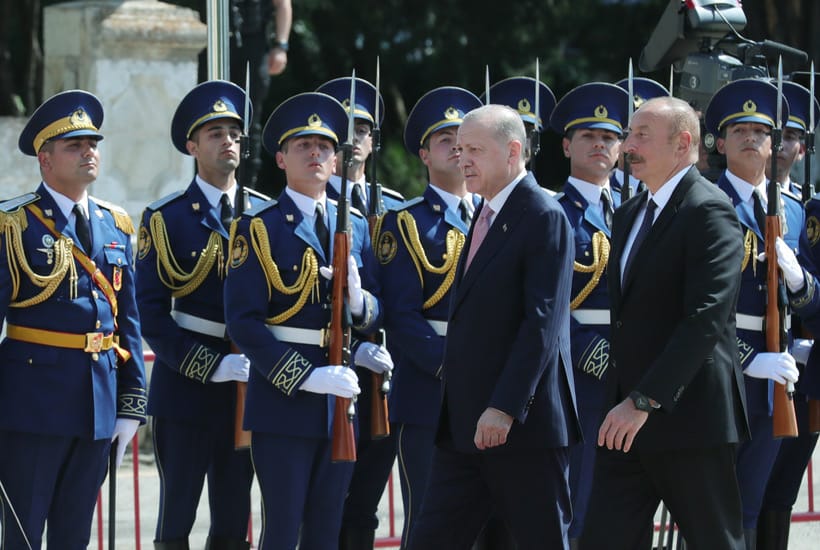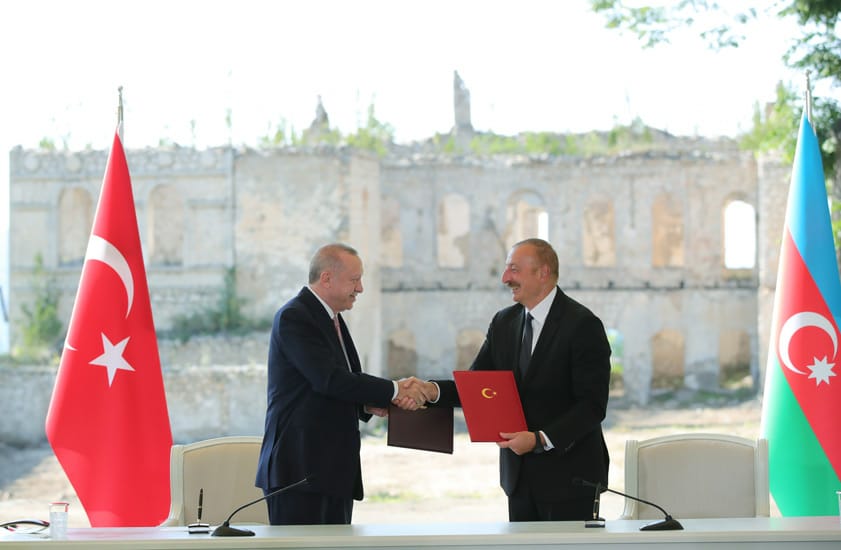Erdogan And Aliyev Sign The Shusha Declaration In Azerbaijan
Following the NATO Summit in Belgium, Turkey’s President Erdoğan traveled to Azerbaijan. President of Azerbaijan Ilham Aliyev greeted Erdoğan in Fuzuli and afterwards the two leaders then traveled together to Shusha. In Shusha, President Erdoğan was greeted with a formal ceremony. The two leaders then had a one-on-one meeting, after which the Shusha Declaration was signed. The two leaders held a press conference after the signing ceremony.
Aliyev said at the press conference, “Today is a momentous day in our lives, one that will go down in history. In the region of Karabakh, in the region of Shusha, we greet the dear President of our brotherly country, Recep Tayyip Erdoğan. On this occasion, on behalf of all Azerbaijanis, I greet my dear brother in Shusha and Karabakh.” “The signed Shusha declaration is the guarantee of our new cooperation,” Aliyev added in his speech. “From now on, we’ll be there for each other,” he stated.
After Aliyev, President Erdoğan took the stage. He told press that, “Today, we are experiencing a different level of excitement. We are following through on our previous promise. Karabakh is now in the hands of the rightful owners after 44 days of fighting.” Erdoğan went on to say that: “On December 10 of last year, my brother Aliyev and I shared the joy of the heroic Azerbaijani army in taking back Karabakh. I’m delighted to be with him again, this time in the old city of Shusha, six months later. I congratulate the Azerbaijani people on their victory in Karabakh once more.”

President Erdoğan emphasized that, following the Armistice Agreement, new chances for collaboration have arisen for all parties in the region. “We mentioned six platforms,” Erdogan remarked. “Russia, Turkey, Azerbaijan, Armenia, Georgia, and Iran are just a few of the countries involved. We now want the region to be a place where we can all live in harmony, thanks to these six platforms. Mr. Putin included, we are all willing to make any number of sacrifices to take this step. Our greatest wish is that this historic chance is not squandered due to irrational enthusiasm. It is critical that everyone in the region abandons hate and provocation politics. When the time arrives, we say we will do our part to establish normalization with Armenia.”
Erdoğan mentioned Bayraktar TB-2 UCAVs built by Baykar Defence in his address, which he said influenced the course of the 2020 Nagorno-Karabakh war. “UAVs and UCAVs have done significant work in this area. In these projects, Azerbaijan will have the possibility to be the hub of production. Our strength is Azerbaijan’s strength. Azerbaijan’s strength is likewise our strength.” He also stated that he wishes to establish a general consulate in Shusha as soon as possible.
The following are some key points from the Shusha Declaration signed by Erdoğan and Aliyev, the cover significant ground ranging from military assistance and trade to discourse around the Armenian Genocide:
- The parties declare the perspectives of further expansion and deepening of Turkey-Azerbaijan relations by examining all aspects.
- When any of the Parties believes that a third state or states is threatening or attacking their independence, sovereignty, territorial integrity, inviolability, or security of their internationally recognized borders, the Parties shall hold joint consultations and they will take initiative in accordance with UN principles and give each other the assistance they require in accordance with the UN Charter in order to prevent such threats or attacks. The scope and form of this assistance will be determined through urgent negotiations, and it will be resolved to satisfy defense needs in order to take cooperative steps, with coordinated activity of the Armed Forces’ power and management divisions.
- The parties emphasize that Turkey’s contribution to the activities of the Turkey-Russia Joint Center in the liberated territories plays an important role.
- The Parties emphasize the importance of further development of cooperation in the field of cyber security and will carry out joint scientific research studies, expert training in this field, and encourage mutual technical cooperation.
- The parties will expand their joint efforts and cooperation, especially in the fight against terrorism, organized crime, drug trafficking and illegal immigration.
- The parties state that the military-political cooperation developed between the two states and in line with their interests is not against any third state or states.
- The parties emphasize that Armenia’s baseless allegations against Turkey, the distortion of history and attempts to politicize historical facts by falsifying historical facts harm peace and stability in the region, and in this context Turkey, which opened its own archives regarding the events of 1915, and Azerbaijan support opening up the archives in Armenia and other countries and to conduct research on this subject by historians.
- The parties highlight Turkey and Azerbaijan’s pioneering role in the implementation of the strategic Southern Gas Corridor, which contributes to the region’s and Europe’s energy security by diversifying natural gas resources and routes. The parties will coordinate their efforts to make the Southern Gas Corridor more effective and develop it further.
- The two brotherly countries’ armed forces will continue to be restructured and modernized in conformity with the needs of the era by the parties working together.
- The parties assert that the opening of the Zengezur Corridor connecting Turkey and Azerbaijan and the Nakhchivan Autonomous Republic of the Azerbaijan Republic, as well as the construction of the Nakhchivan-Kars railway as a continuation of the aforementioned corridor, will significantly contribute to the intensification of transport-communication relations between the two countries.
- The parties agree that the opening of the Zengezur Corridor connecting Turkey and Azerbaijan and the Nakhchivan Autonomous Republic of the Azerbaijan Republic, as well as the construction of the Nakhchivan-Kars railway as a continuation of the said corridor, will significantly contribute to the intensification of transport-communication relations between the two countries.

